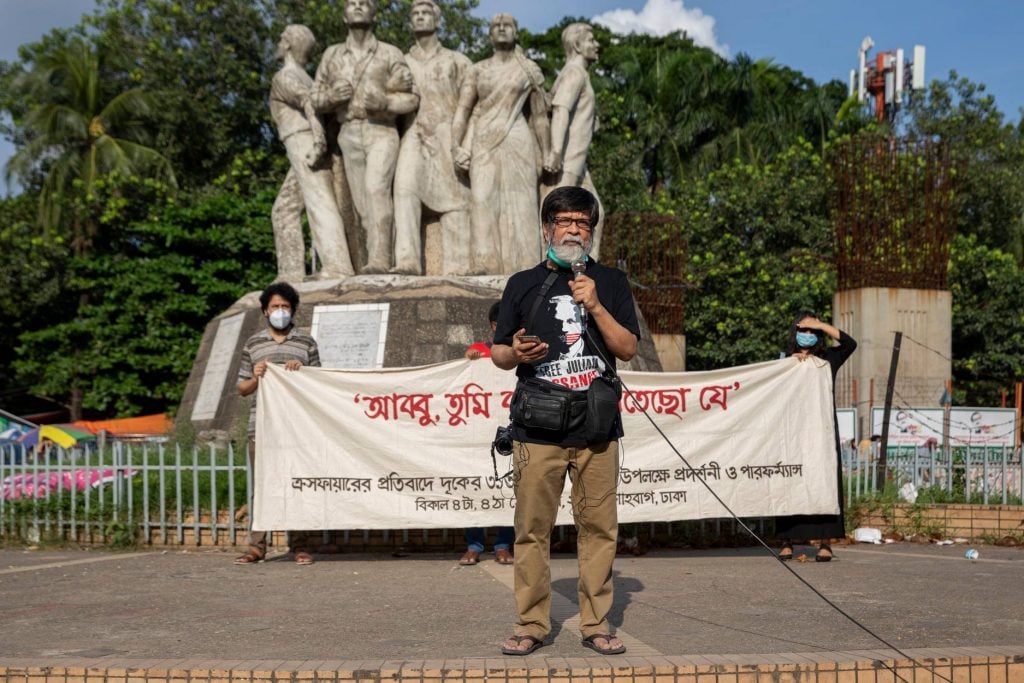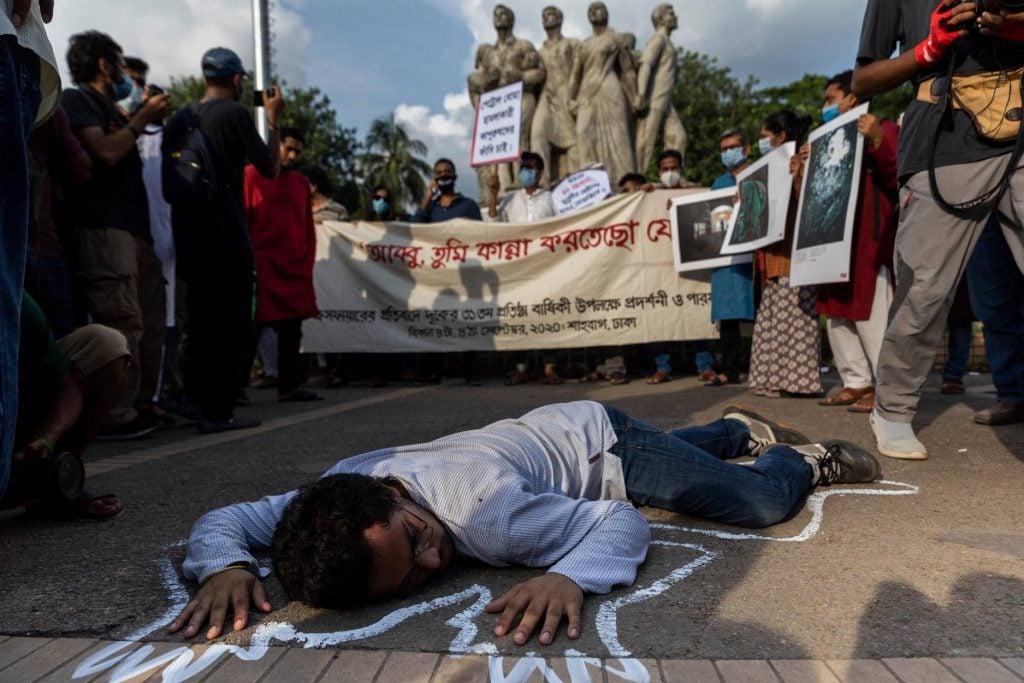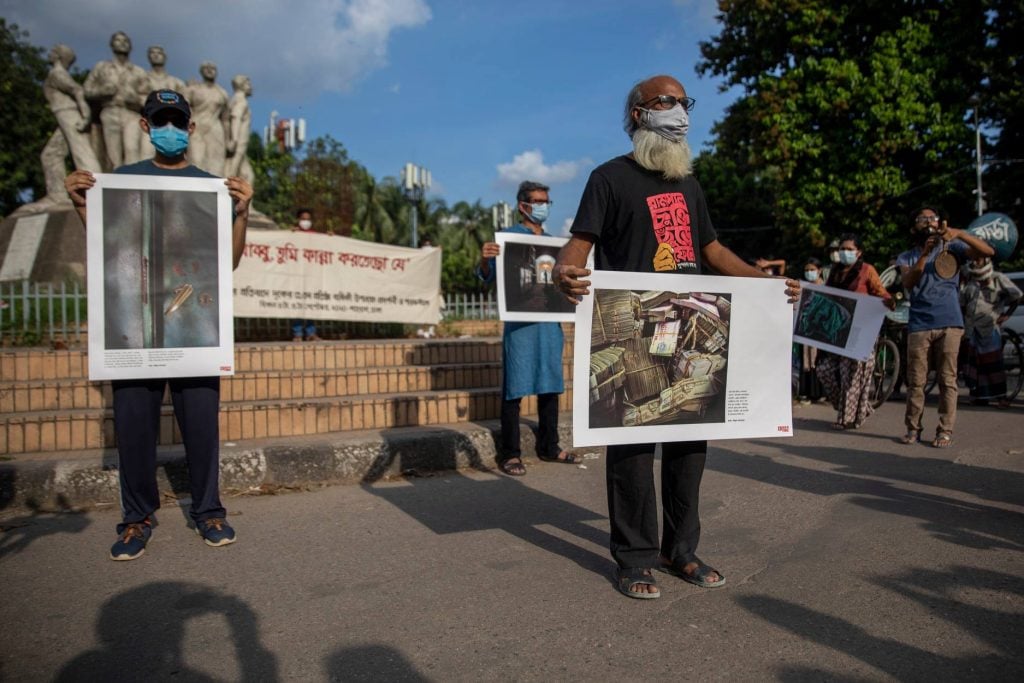Law & Politics
In Bangladesh, Pro-Government Forces Disrupted a Protest Performance Featuring Photos by Artist Shahidul Alam
Some 60 human rights activists have issued a statement condemning the action.

Some 60 human rights activists have issued a statement condemning the action.

Taylor Dafoe

A peaceful demonstration against the extrajudicial killing of Bangladeshi citizens was disrupted by counter-protesters affiliated with the country’s ruling party in Dhaka earlier this month.
The performance, staged at the University of Dhaka on September 4, was organized by Drik Gallery around an exhibition of photographs by artist and activist Shahidul Alam. Demonstrators laid on the pavement outlined in chalk and held up images from Alam’s acclaimed series “Crossfire,” which depicts sites of murder committed by the Rapid Action Battalion, an anti-terrorist arm of the Bangladeshi police. The event was live-streamed on the gallery’s Facebook page.
Shortly after it began, more than 100 members of the ruling party led by Dhaka South City councilor Hasibur Rahman Manik violently interrupted the protest, according to a statement decrying the harassment submitted by 60 human rights activists to Bangladeshi newspaper the Daily Star, which first reported the news.
“In the context of this whole incident, we want to ask the government whether it favours extrajudicial killings and is against peaceful protest and cultural expressions recognised by the constitution,” the letter states.

A demonstrator at the University of Dhaka on September 4. Courtesy of Drik, via Facebook. Photo: Habibul Haque.
Drik Gallery did not immediately respond to Artnet News’s request for comment, but a post on their website gave an account of the events which began at the Raju Bhahskorjo memorial sculpture on the university campus (Shahbag is a neighborhood in Dhaka; Chobir Hat is an art market on the University campus):
Within minutes of starting our programme, bus loads of people also carrying pro government placards and shouting slogans came over to Raju Bhahskorjo. A rally carrying pro-government placards also came over from Shahbag and walked right inside our performance taking position there. Throughout this period they tried to snatch away our banner and tear up our photographs, while displaying their own banners and shouting slogans. They also started mimicking the performers and later started threatening them. A woman complained of being groped. We cut short our programme and carried out a procession towards Shahbag ending up in Chobir Hat. There we ended the programme by observing a minute’s silence in remembrance of the people killed by crossfire.
We had earlier announced that we would hold our event in protest of crossfire killings at Shahbag at 4:00 pm on Drik’s anniversary, Friday the 4th September. At around 3 pm we saw that a large number of people carrying pro-government placards, and a massive contingent of police had occupied Shahbag. We immediately decided to move our event to Raju Sharokh Bhashkorjo (Anti Terrorism Raju Memorial Sculpture), near the Teachers Students Centre of Dhaka University. Within minutes of starting our programme, bus loads of people also carrying pro government placards and shouting slogans came over to Raju Bhahskorjo. A rally carrying pro-government placards also came over from Shahbag and walked right inside our performance taking position there. Throughout this period they tried to snatch away our banner and tear up our photographs, while displaying their own banners and shouting slogans. They also started mimicking the performers and later started threatening them. A woman complained of being groped. We cut short our programme and carried out a procession towards Shahbag ending up in Chobir Hat. There we ended the programme by observing a minute’s silence in remembrance of the people killed by crossfire.
Posted by Drik on Friday, September 4, 2020
Alam founded Drik Gallery in September 1989—31 years before this month’s protest performance, which was something of an anniversary celebration. His 2010 exhibition of “Crossfire” pictures at the venue was shut down by police. In 2018, Alam was detained for over 100 days without bail by Bangladeshi authorities for “provoking people and spreading false information and propaganda against the government,” during which time he claimed he was tortured.

Demonstrators at the University of Dhaka on September 4. Courtesy of Drik, via Facebook. Photo: Habibul Haque.
The incident sparked an international outcry as artists, activists, academics, celebrities, and human rights organizations demanded his release. Alam was freed after being granted bail on November 20, 2018. Later that year, he was named one of TIME magazine’s persons of the year. His first U.S. survey is currently on view at the Rubin Museum in New York.
Thousands of Bangladeshi citizens have died in “crossfire” with the Rapid Action Battalion since it was formed in 2004, including over 1,000 in the last three years alone.